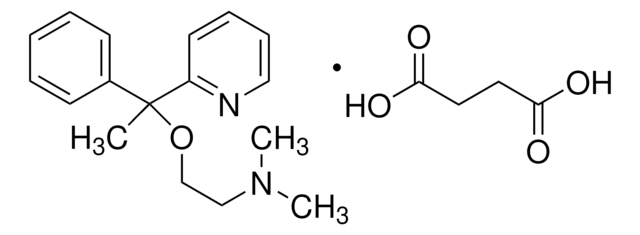おすすめの製品
由来生物
rabbit
品質水準
結合体
unconjugated
抗体製品の状態
affinity isolated antibody
抗体製品タイプ
primary antibodies
クローン
polyclonal
形状
buffered aqueous solution
化学種の反応性
mouse, human, rat
テクニック
indirect ELISA: suitable
western blot: suitable
UniProtアクセッション番号
輸送温度
dry ice
保管温度
−20°C
ターゲットの翻訳後修飾
unmodified
遺伝子情報
human ... GDF6(392255)
詳細
Growth differentiation factor 6 (GDF6) is a secreted signalling molecule, that belongs to the family of bone morphogenetic protein (BMP). Gdf6 is expressed in embryonic tissues that is concerned with patterning of skeletal and soft tissue. In human chromosome, the gene GDF6 is localized on 8q22.1.
免疫原
a 17 amino acid peptide near the carboxy-terminus of the human GDF6.
アプリケーション
Anti-GDF6 antibody produced in rabbit has been used in western blotting.
生物化学的/生理学的作用
Growth differentiation factor 6 (GDF6) plays a crucial role in the joint formation during skeletal development. Gdf6 is involved in the maintenance of articular cartilage of knee. Mutation of GDF6 leads to loss-of-function and causes Klippel-Feil syndrome. Microduplication of GDF6 leads to an autosomal-dominant rheumatic condition, Leri′s pleonosteosis (LP). Mutations in GDF6 causes Multiple synostoses syndrome subtype SYNS4. In SYNS4, there is fusion of joints leading to progressive conductive deafness. GDF6 plays a key role in ocular development and the mutation of GDF6 leads to microphthalmia and anophthalmia. Mutations in GDF6 also leads to Leber congenital amaurosis-17.
関連事項
The action of this antibody can be blocked using blocking peptide SBP4691.
物理的形状
PBS溶液(0.02%アジ化ナトリウム含有)。
免責事項
Unless otherwise stated in our catalog or other company documentation accompanying the product(s), our products are intended for research use only and are not to be used for any other purpose, which includes but is not limited to, unauthorized commercial uses, in vitro diagnostic uses, ex vivo or in vivo therapeutic uses or any type of consumption or application to humans or animals.
適切な製品が見つかりませんか。
製品選択ツール.をお試しください
関連製品
保管分類コード
10 - Combustible liquids
WGK
WGK 2
引火点(°F)
Not applicable
引火点(℃)
Not applicable
適用法令
試験研究用途を考慮した関連法令を主に挙げております。化学物質以外については、一部の情報のみ提供しています。 製品を安全かつ合法的に使用することは、使用者の義務です。最新情報により修正される場合があります。WEBの反映には時間を要することがあるため、適宜SDSをご参照ください。
Jan Code
PRS4691-100UG:
試験成績書(COA)
製品のロット番号・バッチ番号を入力して、試験成績書(COA) を検索できます。ロット番号・バッチ番号は、製品ラベルに「Lot」または「Batch」に続いて記載されています。
Eye and neural defects associated with loss of GDF6
Hanel ML and Hensey C
BMC Developmental Biology, 6(1), 43-43 (2006)
A new subtype of multiple synostoses syndrome is caused by a mutation in GDF6 that decreases its sensitivity to noggin and enhances its potency as a BMP signal
Wang J, et al.
Journal of Bone and Mineral Research, 31(4), 882-889 (2016)
Growth differentiation factor 6 derived from mesenchymal stem/stromal cells reduces age-related functional deterioration in multiple tissues
Hisamatsu D, et al.
Aging (Albany. NY.), 8(6), 1259-1259 (2016)
GDF6, a novel locus for a spectrum of ocular developmental anomalies
Asai-Coakwell M, et al.
American Journal of Human Genetics, 80(2), 306-315 (2007)
Daisuke Hisamatsu et al.
Aging, 8(6), 1259-1275 (2016-06-18)
The senescence-associated secretory phenotype (SASP) has attracted attention as a mechanism that connects cellular senescence to tissue dysfunction, and specific SASP factors have been identified as systemic pro-aging factors. However, little is known about the age-dependent changes in the secretory
ライフサイエンス、有機合成、材料科学、クロマトグラフィー、分析など、あらゆる分野の研究に経験のあるメンバーがおります。.
製品に関するお問い合わせはこちら(テクニカルサービス)





